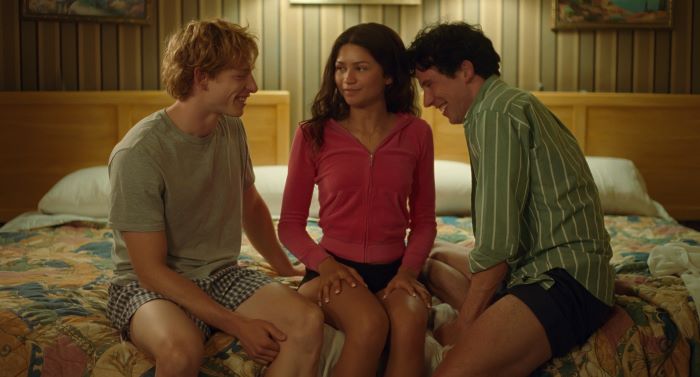![]() With films such as Call Me by Your Name and A Bigger Splash, director Luca Guadagnino has proven himself masterful at unveiling roiling erotic tensions. His latest feels even more rousing and operatic than past efforts, with stirring cinematography by Sayombhu Mukdeeprom, silk-smooth editing by Marco Costa, and a charging techno score by Trent Reznor and Atticus Ross.
With films such as Call Me by Your Name and A Bigger Splash, director Luca Guadagnino has proven himself masterful at unveiling roiling erotic tensions. His latest feels even more rousing and operatic than past efforts, with stirring cinematography by Sayombhu Mukdeeprom, silk-smooth editing by Marco Costa, and a charging techno score by Trent Reznor and Atticus Ross.
Initially set in New Rochelle, New York, in 2019, Art Donaldson (Mike Faist) is a celebrated, thirtysomething tennis pro married to his manager, Tashi (Zendaya). Tashi was destined to be a huge tennis player, but an injury in college sidelined her career. Off the courts, they live a quiet, cocooned existence with their young child. Like their sleek, monochromatic luxury hotel surroundings, their marriage seems somewhat chilly and dull, despite their financial and professional success.
After having lost a string of matches, Art is encouraged by Tashi to play in a lower tier tournament. Unbeknownst to him, he is against Patrick Zweig (Josh O’Connor), a former best friend and Tashi’s ex-boyfriend. Patrick, a broke middling tennis player, has signed up for the match for the cash. Throughout the course of this puzzle-like, flashback-heavy film, the story of this trio unravels—from their early college years, where all three were on the precipice of becoming tennis stars, into their fractured adulthood, cutting back and forth to a merciless match.
At the center of this love triangle lies Tashi, who, at times, shows an upper hand of controlling the two, including an initial meet-up where she revels in watching them kiss—one of the film’s most craftily assembled, amusing, and mesmerizing scenes. Throughout, there is a constant push and pull of who is in power and who is not, akin to their sport, which is referred to at one point as a game of “conversation.” The allegory can be obvious, but enjoyably and not oppressively so.
Reznor and Ross’s score pumps loudly over tense matches, but also in scenes that would perhaps otherwise feature more quietly brooding music, or no score at all. The music can be noticeable, yet also an invigorating contrast to some of the realist, emotional moments, such as an explosive, life-altering fight between Patrick and Tashi. I can’t think of many scores of its ilk since Tom Tykwer, Johnny Klimek, and Reinhold Heil’s music for Run Lola Run, an end-of-the-20th-century oddity, when this kind of pulsating techno was in vogue. (For those who need a refresher or have never seen it, a 4K restoration of Run Lola Run will be released on June 7.) A moody piano melody plays over a beach scene between the three and serves as a love theme, with Tashi framed bewitchingly under a moon. Later, the theme morphs into a techno number as the trio’s relationships become more fraught. This may not be what the trio would seem to listen to, nor of the times that they live in, nor their sport (the spectators: pin-drop quiet), but the score’s breathless energy and clockwork beats suggests their stresses and psyche.
Mukdeeprom’s cinematography is similarly audacious and ingenious, with crane shots, wide angles, and intimate close-ups. Occasionally, there is a playful use of point-of-view shots from its characters, and even the tennis balls (which leads to some goofy yet admittedly thrilling moments). The work is flashy, but the pizazz never overwhelms the picture. Instead, it adds a sense of humor or poignancy. When Faist looks into the camera in one flashback scene, it stirs a tremendous feeling of longing and beauty.
Where the camera is positioned and how the film is edited, so skillfully by Costa, are also aspects of the queer subtext. While Art and Patrick ogle over Tashi, the film ogles over them—the camera lingering in the most erotic ways, sometimes subtle, sometimes not. Outside of the climatic match, the most memorable scenes between the two men are sexually suggestive—a cafeteria scene, where they jocularly munch on churros, and a later combative one, where the two go toe-to-toe in a sauna. Besides those suggestive churros, there’s also a banana. In the story’s present-time frame, sleekly sculpted Art is on a strict macro diet, while the scruffy and broke Patrick scarfs down someone else’s Dunkin’ breakfast sandwich—the emphasis on food and pleasure is a motif for Guadagnino. (Think peach!)
Challengers has a pleasingly cast, with the director accentuating the actors’ strengths. Darnell Appling, Zendaya’s longtime assistant, is a standout as the New Rochelle match’s umpire. Perched upon a chair, his muted and crisp readings of judgements and scores has a bemused, above-it-all air that’s quite funny. Zendaya is at her best when she exudes aloofness or quiet scheming. Her broader moments are less emotionally effective, yet she has a distinctive, stylish, movie star presence. Her transformation from smiley, long, wavy-haired optimistic teenager to an adult of addled malaise (with what could become an iconic bob hair cut) is haunting and deviously watchable.
Faist, who emanated theater kid energy in Steven Spielberg’s West Side Story, is given a more down-to-earth role and is completely convincing. With his rumpled, disheveled handsomeness, O’Connor, who delivers another terrific turn in this year’s La Chimera, seems at ease at infusing Patrick with wily unpredictability. This trinity of the cool Hollywood star, the theater kid, and the versatile indie actor lends itself to a powerful collaboration of differing styles and tensions among the trio. Their sweat-drenched physicality of racket-thwacking tennis playing is rigorously believable. Like so much here, it often made me wonder how things were done. It’s quite astonishing.







Leave A Comment